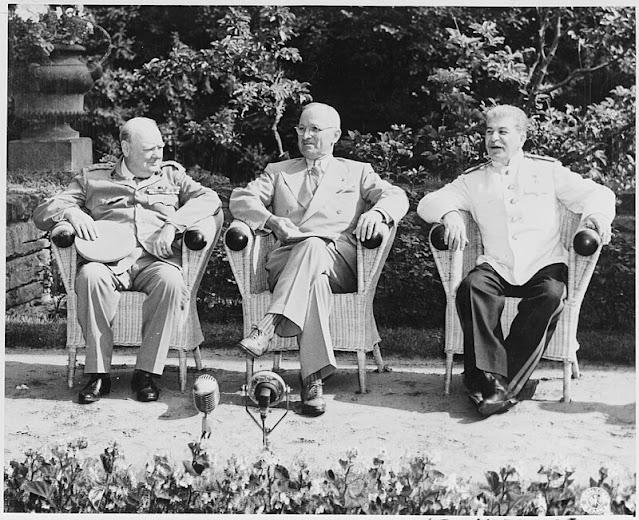Old Pals...
There is much speculation as to how the impending Trump presidency [Part II] will impact our so-called 'Special Relationship™' with the US, and how much bending over backwards will need to be done by the Labour government to accommodate this - ahem! - capricious individual. This mythic construct of the special relationship between the US and the UK is of course a post-second-world-war invention, born out of political expediency. The Cold War was itself a construct of the Potsdam Conference, The Berlin Agreement, etc., divvying up Germany into seemingly arbitrary parcels - and Europe - between The Soviet Union, The United States, The United Kingdom [oh, and France were invited, too]. The strong, defining the weak's relationship with the world, as ever. For the next thirty years or so, Berlin itself was stark testimony to the arbitrariness of working class lives and their fate at the hands of the powerful, carved in two as it was, ultimately, by The Berlin Wall; the archetypal symbol of the era.
Trump holds such historical strong men as Churchill, Truman and Stalin in great stead as they feature in his pantheon of 'political' heroes, much in the same way he currently admires Putin. Except, his admiration for anyone stretches only as far as their usefulness to him personally continues, in order to further his project of global self-aggrandisement; and he would think very little of kicking them into the long grass at the merest whim. I wouldn't be so crass as to compare him with Adolf Hitler, but he shares with him a proclivity for changing allegiances with the wind and weaponising 'difference' as a tool of division in furthering his cause. From the point of view of the notion of the 'special relationship', though, it's interesting to note that, in the very early months of the First World War, The Los Angeles Examiner - a William Randolph Hearst newspaper - ran with anti-war polemic aimed squarely at The British Empire [frankly, I've no argument with that, but that's a whole 'nuther story, to coin a phrase].
I won't quote the entire piece, but it starts with the headline: 'British Greed Would Drag U.S. Into War', and continues: 'So America has the greatest interest in having a strong central power in Europe. That is the way she can keep out of the general struggle...'. Hardly a cosy relationship and one more reflecting the post-revolution America of the eighteenth century and its relationship with its former colonial 'masters'. Complex, innit? We are all of us spoon-fed gobbets of historicist distortions of actual history - throughout our lives; not just at school - that are tailored to fit any particular prevailing national mythology and reinforce those itchy little human prejudices, giving them political and social validity in the service of 'the Great and the Good', who apparently know what's best for us.
Trump sees Putin's Russia as 'a strong central power in Europe' and therefore of use to his project; and it's doubly ironic that The United Kingdom has once again been the destabilising influence on the continent by leaving the only logical, strong, central European power: the EU, and greatly weakening it in the process, leaving in its wake the growth of the Far Right once again. The echoes of The First World War and its aftermath resound ever louder in the twenty-first century. This time, though, we are no longer an Empire. We are no more than an isolated, economically-depleted archipelago that has repeatedly been shat upon by successions of right-wing administrations and neoliberal capitalists, ever since Potsdam. Starmer's got his work cut out just to fathom any kind of future 'relationship' with the President-Elect. We dearly need a special relationship; just not with Trump, if you please.




Comments
Post a Comment